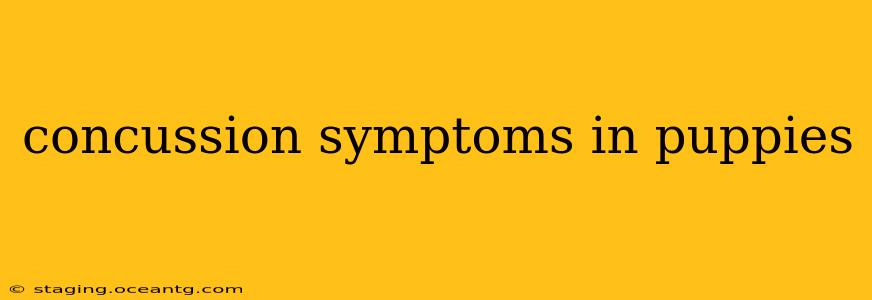Concussions in puppies are a serious concern, requiring prompt veterinary attention. Unlike adult dogs, puppies' developing brains and nervous systems are more vulnerable to the effects of head trauma. Recognizing the symptoms early is crucial for successful recovery. This comprehensive guide will help you understand the signs of a concussion in your puppy and what steps to take.
What is a Concussion?
A concussion, also known as a mild traumatic brain injury (mTBI), is a brain injury caused by a blow or jolt to the head or body. This impact causes the brain to move rapidly back and forth inside the skull. This sudden movement can cause the brain to bounce against the skull or twist and stretch nerve fibers. In puppies, the delicate nature of their developing brains makes them particularly susceptible to the damaging effects of even seemingly minor impacts.
Common Concussion Symptoms in Puppies
Identifying concussion symptoms in puppies can be challenging as they may not always exhibit the same signs as adult dogs. However, some key indicators to watch for include:
-
Changes in Behavior: This is often the first and most noticeable sign. Your puppy might seem lethargic, unusually quiet, or withdrawn. They may show decreased interaction with you or other animals. Conversely, some puppies might become unusually agitated or restless.
-
Loss of Coordination (Ataxia): This manifests as stumbling, difficulty walking, or a wobbly gait. They might seem clumsy or have trouble navigating familiar spaces.
-
Vomiting and/or Diarrhea: Gastrointestinal upset is a common symptom following head trauma.
-
Head Pressing: Your puppy might press their head against walls or objects. This is a significant sign requiring immediate veterinary attention.
-
Dilated Pupils: Noticeably enlarged pupils can be an indication of a more severe head injury.
-
Seizures: In some cases, a concussion can trigger seizures, a medical emergency requiring immediate veterinary care.
-
Loss of Consciousness: While not always present, loss of consciousness, even briefly, is a serious sign indicating a significant head injury.
H2: How Can I Tell if My Puppy Has a Concussion vs. Another Illness?
Differentiating a concussion from other illnesses can be difficult and requires veterinary expertise. Many illnesses can exhibit similar symptoms, such as lethargy, vomiting, or diarrhea. The key distinguishing factor is often the mechanism of injury – a blow to the head or body. If you suspect a head injury, even a minor one, it's vital to seek immediate veterinary care.
H2: What Should I Do if I Think My Puppy Has a Concussion?
Do not attempt to treat a suspected concussion at home. Immediate veterinary attention is crucial. Your vet will conduct a thorough examination, potentially including neurological testing, to determine the severity of the injury. Early diagnosis and intervention can significantly improve your puppy's chances of a full recovery.
H2: What is the Treatment for a Puppy with a Concussion?
Treatment for a puppy with a concussion will depend on the severity of the injury. It typically involves rest, supportive care, and close monitoring. Your veterinarian may recommend pain medication or anti-nausea medication to manage symptoms. In severe cases, hospitalization may be necessary.
H2: How Long Does it Take for a Puppy to Recover from a Concussion?
Recovery time varies depending on the severity of the concussion. Some puppies may recover within a few days, while others may require weeks or even months. Your veterinarian will provide guidance on rest, activity restrictions, and ongoing monitoring.
H2: How Can I Prevent Concussions in My Puppy?
Preventing concussions is crucial. Here are some preventative measures:
- Supervise playtime: Ensure your puppy plays safely, avoiding roughhousing or falls from heights.
- Puppy-proof your home: Remove hazards that could cause your puppy to fall or bump their head.
- Secure your yard: Prevent your puppy from running into streets or other dangerous areas.
- Use appropriate harnesses and leashes: Ensure your puppy is safely secured when on walks or in the car.
Remember, a concussion is a serious injury in puppies. Early detection and veterinary intervention are critical for a positive outcome. If you notice any of the symptoms listed above, please seek immediate veterinary care. This information is for general knowledge and should not replace professional veterinary advice. Always consult your veterinarian with any concerns regarding your puppy's health.
